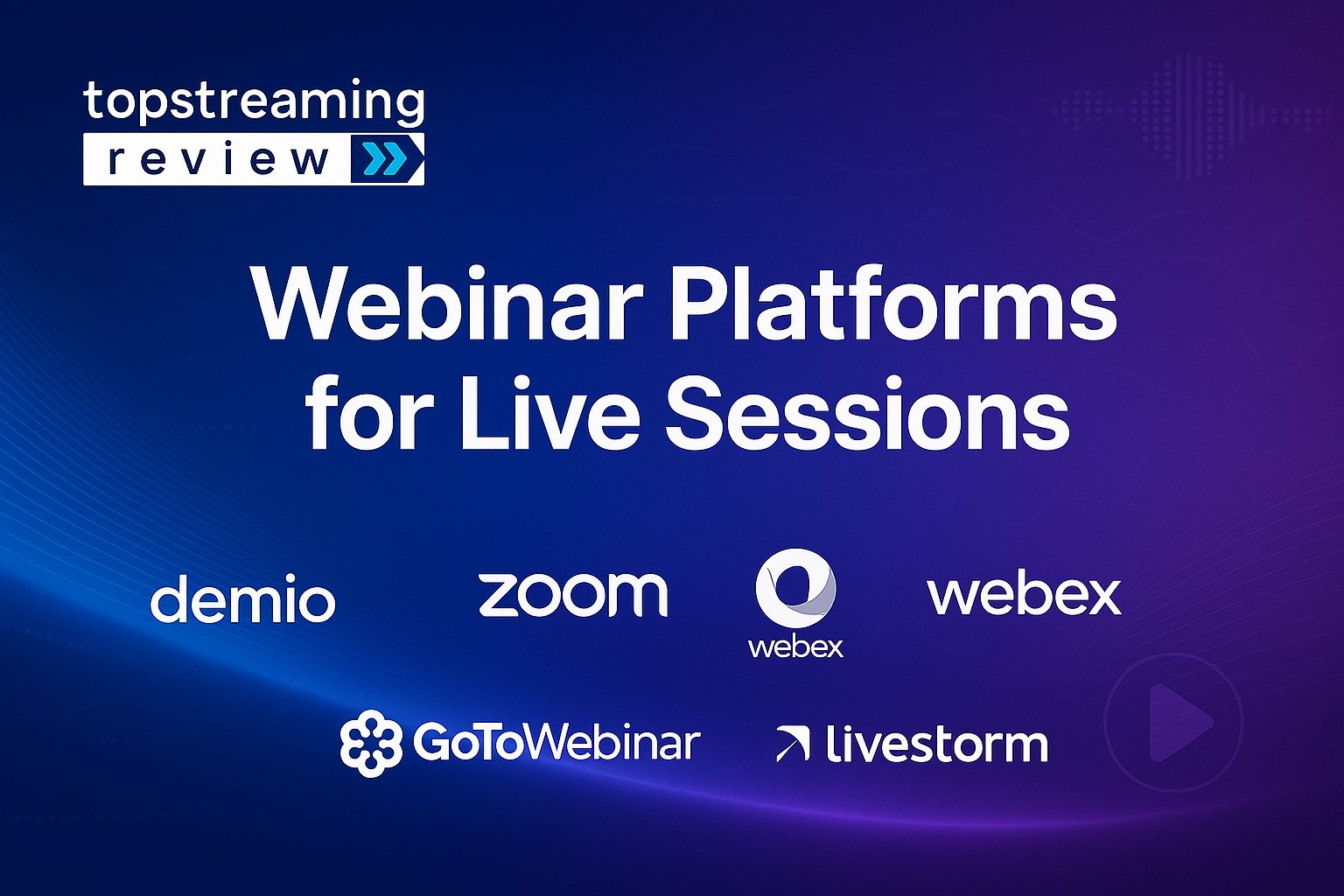
Last Updated on December 12, 2025
Webinars aren’t a new idea, but in 2025 they’ve become part of everyday business. People webinar for their product demos, online classes, team training, and even big virtual events. The way you run them depends a lot on the platform you pick.
Some tools are simple and free, good enough for small groups or community sessions. Others are built for scale, with automation, marketing integrations, and room for thousands of attendees. There’s no single “best” option—it really comes down to what you need.
In this guide, we’ll look at 7 webinar platforms that stand out in 2025. We’ll cover what they cost, what they do well, and where they fall short. That way you can find the one that actually fits your setup instead of wasting time testing dozens of tools.
Key Factors to Consider Before Choosing a Webinar Platform
Not every webinar tool is built the same. Some focus on simple hosting, while others pack in automation, analytics, and marketing features. Before you settle on one, it helps to look at a few basics:
- Audience size – Will you be hosting a small training session with 20 people, or a large event with thousands of attendees?
- Type of webinar – Do you need live sessions, automated evergreen webinars, or a mix of both?
- Engagement features – Look for polls, Q&A, breakout rooms, or even timed call-to-action pop-ups if you plan to drive conversions.
- Integrations – Connecting with CRM or email tools (like HubSpot, Mailchimp, or Salesforce) makes follow-up much easier.
- Budget – Free plans work fine for small sessions, but most businesses eventually move to paid tiers for better capacity and analytics.
- Security and compliance – Especially important for schools, healthcare, and enterprises handling sensitive data.
Why the Right Webinar Platform Matters in 2025
The webinar space has grown fast over the last few years. What started as simple online meetings has turned into a full industry with tools for:
- Marketing and lead generation – Platforms now include call-to-action buttons, branded registration pages, and CRM integrations.
- Education and training – Teachers, coaches, and corporate trainers rely on features like quizzes, polls, and replay access.
- Large-scale events – Enterprises host product launches, conferences, and virtual summits with thousands of attendees.
- Automated sessions – On-demand and evergreen webinars allow businesses to generate leads 24/7 without going live every time.
The result? Choosing the wrong platform can limit your reach, reduce engagement, or cost more than it should. That’s why comparing the best options is worth the effort before you invest. With that in mind, here are the 7 best webinar hosting platforms in 2025, covering both free and paid choices.
Quick List: 7 Best Webinar Hosting Platforms in 2025
Here’s a quick look at the top platforms we’ll cover in detail:
- WebinarNinja – All-in-one platform for live, automated, and hybrid webinars
- BigMarker – Best for large-scale virtual events and enterprise webinars
- Demio – Simple, browser-based tool built for marketing webinars
- EverWebinar – Focused on evergreen and automated webinars
- eWebinar – Pre-recorded webinars with real-time engagement features
- EasyWebinar – Hybrid webinars with live + automated options
- Zoom & Livestorm – Reliable choices for scale (Zoom) and marketing automation (Livestorm)
1. WebinarNinja
Best All-in-One Webinar Platform
WebinarNinja has built its reputation as a flexible all-in-one solution for webinars. It supports live, automated, hybrid, and even webinar series, making it ideal for educators, marketers, and businesses that want one tool for multiple formats. The platform also includes built-in landing pages, branded registration forms, and email reminders, which reduce the need for third-party add-ons. WebinarNinja pricing plans start at $0.30 per attendee/month and it offers a free 14-day trial for you to explore the features before you pay.
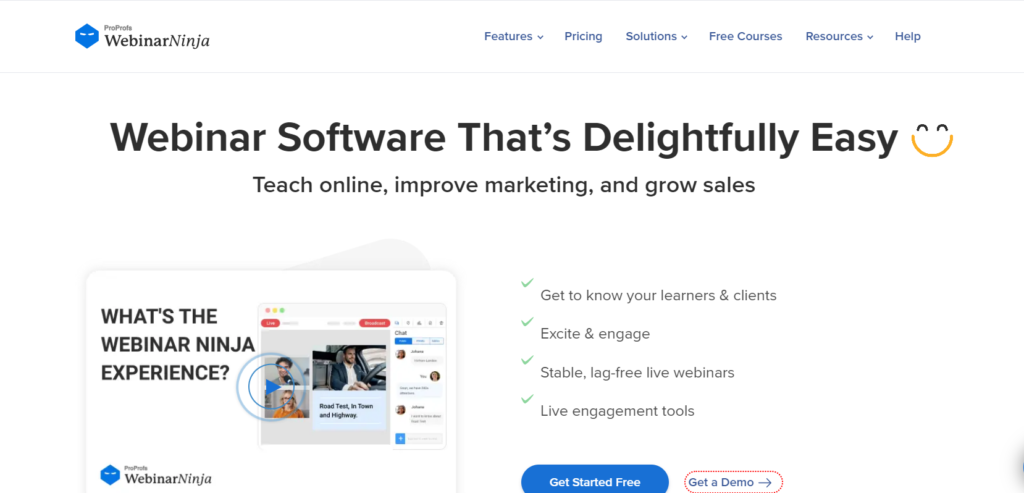
Strengths
- Clean and intuitive interface for both hosts and attendees
- Automatic recordings with replay access
- Native integrations with HubSpot, Mailchimp, ConvertKit, and more
- Detailed analytics to measure attendee engagement and conversions
Limitations
- No downloadable/on-premise version
- Limited design customization (no dark UI mode)
WebinarNinja is best For educators, marketers, and small-to-mid businesses looking for an all-in-one solution that balances ease of use with automation.
2. BigMarker
Best for Enterprise-Scale Webinars & Virtual Events
BigMarker is designed for hosting large-scale virtual events and interactive webinars. It supports up to 10,000 attendees and offers advanced automation features like scheduled polls, pop-ups, and calls-to-action that trigger during events. It’s a favorite among enterprises running conferences, product launches, and branded online summits. BigMarker pricing plans start at $99/month and custom enterprise quotes available for large events and advanced automation.
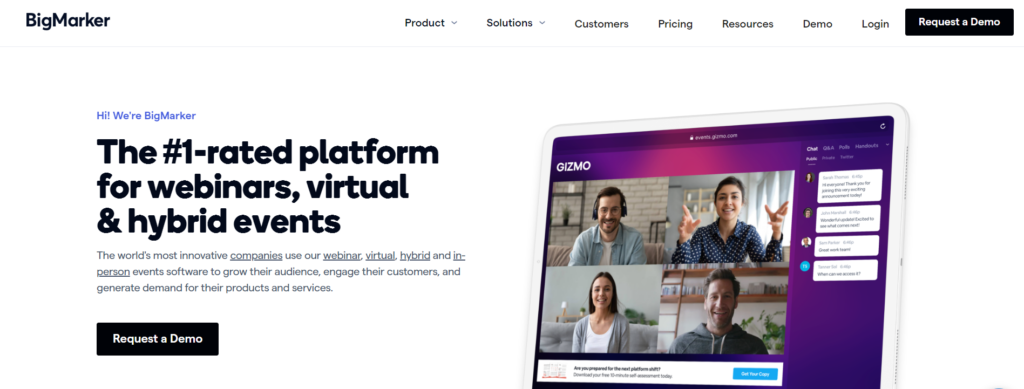
Strengths
- Handles very large audiences (10,000+)
- Advanced automation for polls, handouts, and offers
- HD video and branded landing pages
- Engagement features like breakout rooms and Q&A
- Detailed analytics for tracking conversions
Limitations
- More complex setup compared to lightweight tools
- Slower customer support response on entry-level plans
BigMarker is mostly suitable for enterprises, event organizers, and marketing teams running large-scale virtual events and summits that need advanced automation and engagement.
3. Demio
Best for Simple, Engaging Marketing Webinars
Demio is built with marketers in mind, offering a simple and intuitive way to host live, scheduled, and series webinars. Since it’s browser-based, attendees don’t need to download anything, making it easy to join. It focuses heavily on engagement, with polls, branded registration pages, and automated email reminders. Demio pricing plans start at $45/month for 50 attendees and higher tiers available for larger groups.
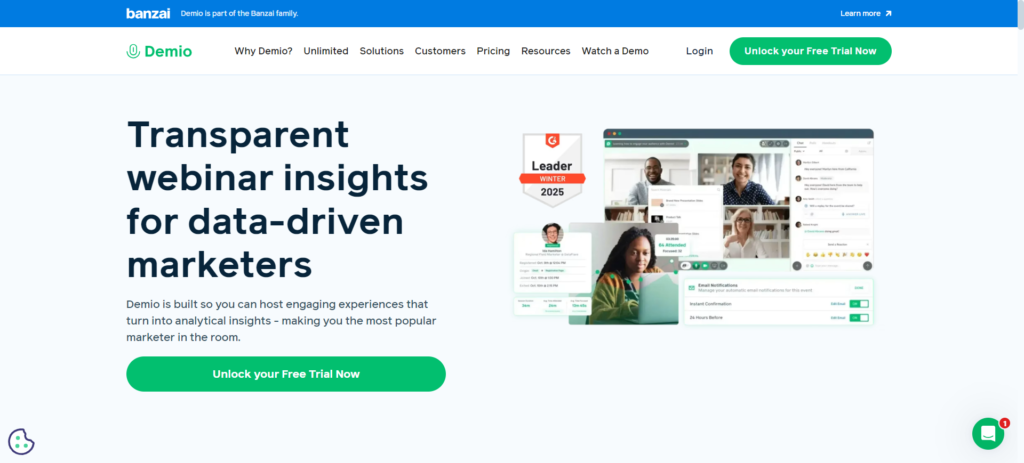
Strengths
- Browser-based (no downloads required)
- Custom branding for registration and event pages
- Automated email notifications for reminders
- Seamless integration via Zapier with marketing tools
Limitations
- Limited customization options compared to enterprise platforms
- Maximum capacity lower than competitors
Demio is suitable for marketers, small businesses, and SaaS companies running lead generation webinars and product demos.
4. EverWebinar
Best for Evergreen & Automated Webinars
EverWebinar specializes in evergreen, automated webinars that mimic live events. With simulated chat, polls, and “just-in-time” sessions, businesses can maximize attendance and conversion without hosting live each time. It’s perfect for those who want a 24/7 lead generation engine. EverWebinar pricing plans starts at $99/month however no free plan (focus on automation features) is offered.
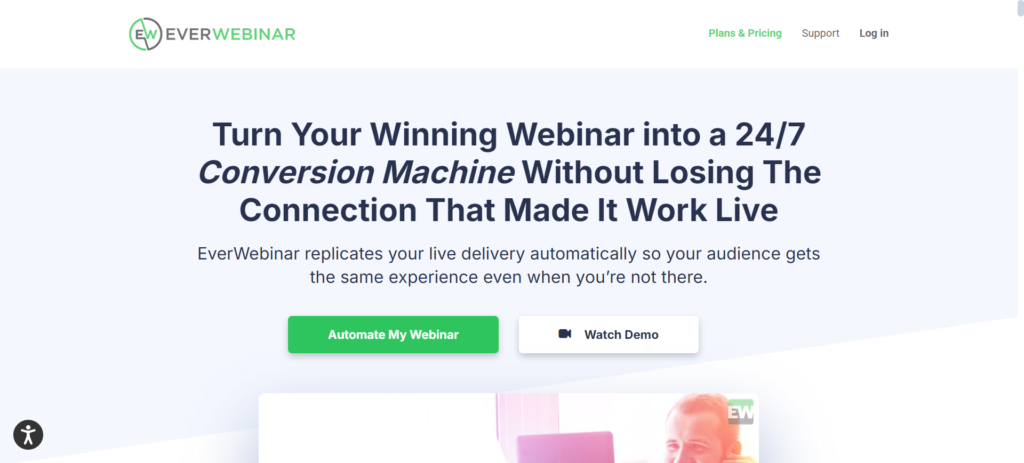
Strengths
- Powerful scheduling with flexible time slots
- Simulated live features (chat, polls) for recorded events
- Strong marketing integrations for follow-ups
- Excellent for lead-generation campaigns
Limitations
- No true live webinar option
- Limited customization for registration pages
EverWebinar is best for businesses focused on evergreen webinars and automated sales funnels that run continuously.
5. eWebinar
Best for Pre-Recorded Webinars with Real-Time Engagement
eWebinar is built exclusively for automated, pre-recorded webinars but adds interaction to keep them engaging. Hosts can insert polls, downloads, or questions at specific times, while attendees can chat with support in real time. This makes on-demand webinars feel personal and interactive. Its paid plans start at $84/month (billed annually) and higher tiers for more active webinars and registrants.
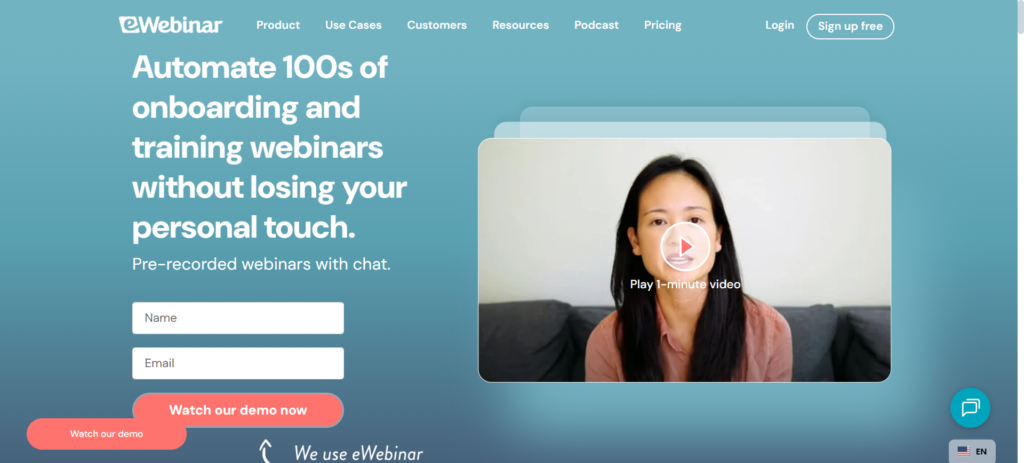
Strengths
- Automated webinars with timed interactions
- Real-time chat support during pre-recorded sessions
- Flexible scheduling and “just-in-time” access
- Detailed analytics for attendee engagement
Limitations
- No live webinar support
- Branding customization is more limited
eWebinar is suitable for Coaches, SaaS businesses, and training providers who want interactive pre-recorded webinars that feel live.
6. EasyWebinar
Best Hybrid Webinar Platform
EasyWebinar combines live and automated webinars in one platform. It’s designed for hybrid use cases where hosts want to broadcast live but also run evergreen replays later. With audience segmentation, multi-presenter support, and browser-based access, it’s a versatile choice for small businesses and coaches. EasyWebinar offers free plan (up to 10 attendees) and paid plans start at $80/month/host.
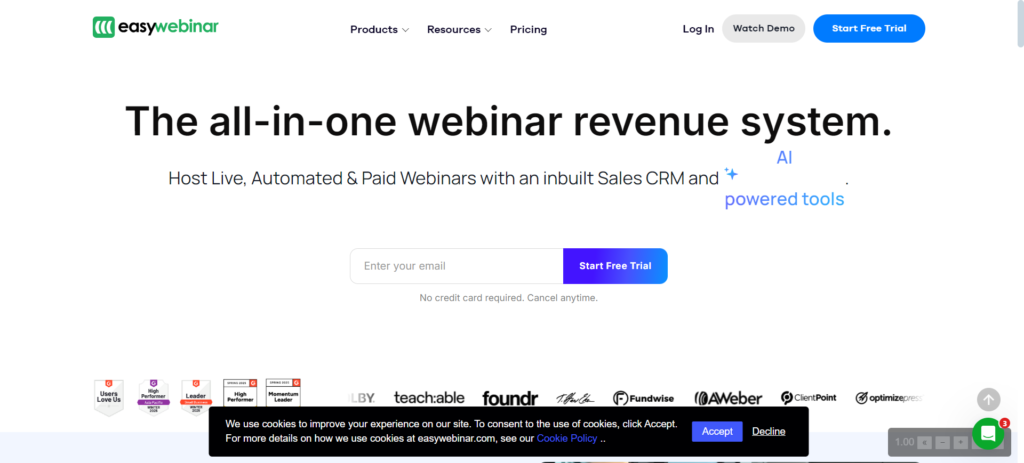
Strengths
- Supports both live and automated webinars
- Multi-presenter broadcasting in HD
- Recurring and evergreen webinar scheduling
- Integrates with popular marketing tools
Limitations
- Landing page customization is limited
- No native CRM built-in
EasyWebinar is best for coaches, consultants, and small businesses that want to run both live and evergreen webinars without switching platforms.
7. Zoom & Livestorm – Familiarity and Marketing Power
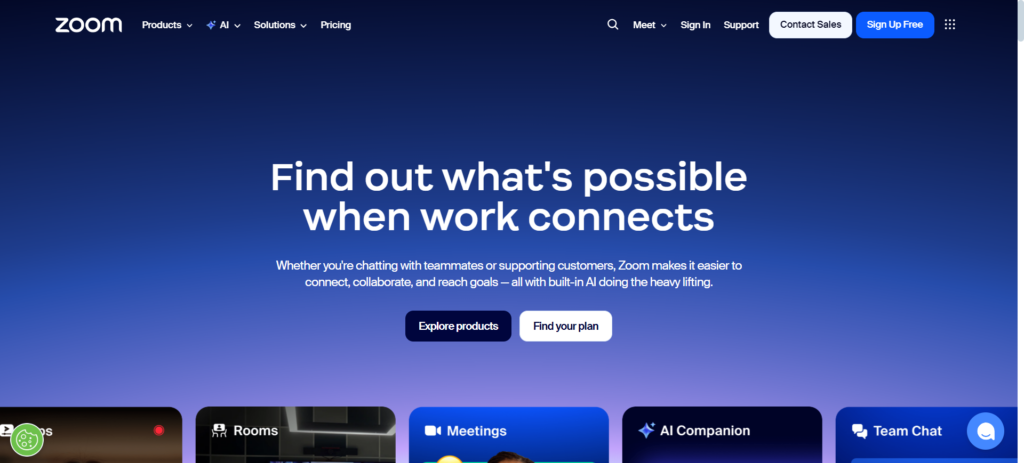
Zoom is the most recognized name in virtual meetings and webinars. It supports up to 50,000 attendees, integrates with YouTube/Facebook, and offers reliable HD streaming. While it requires app downloads, its scalability makes it a go-to for large events. Livestorm focuses more on marketing webinars. It includes customizable registration pages, automated emails, and even AI-powered event assets. Being browser-based, it’s easy for attendees to join. Zoom offers a free tier for small meetings; Paid plans from $79/month for webinars. Livestorm offers free plan for up to 30 attendees; Paid plans from $79/month.
Strengths
- Zoom: Reliability, massive attendee support, strong integrations
- Livestorm: Browser-based, automation features, customizable branding
Limitations
- Zoom: Requires downloads, limited branding options
- Livestorm: Can become costly at scale, limited visual customization
Best For
- Zoom: Enterprises, schools, and organizations running large-scale webinars or virtual conferences
- Livestorm: Marketers and teams running recurring webinars with automation and branding needs
Webinar Platforms Comparison (2025)
| Platform | Free Plan | Starting Price | Max Attendees | Live Webinars | Limitations |
| WebinarNinja | 14-day trial | $0.30/attendee/month | Unlimited | ✅ Yes | Limited UI customization |
| BigMarker | ❌ No | $99/month | 10,000+ | ✅ Yes | Complex setup, slower support |
| Demio | Trial | $45/month (50 seats) | 50–1,000+ | ✅ Yes | Fewer advanced customizations |
| EverWebinar | ❌ No | $99/month | Unlimited | ❌ No | No true live sessions |
| eWebinar | ❌ No | $84/month (annual) | Unlimited | ❌ No | Limited branding, no live option |
| EasyWebinar | ✅ Yes (10) | $80/month/host | Unlimited | ✅ Yes | Basic landing page customization |
| Zoom | ✅ Yes | $79/month | Up to 50,000 | ✅ Yes | Requires downloads, limited design |
| Livestorm | ✅ Yes (30) | $79/month (100 seats) | 100–3,000+ | ✅ Yes | Expensive at scale, limited visuals |
Special Features & Use Cases of webinar hosting platforms (2025)
Each of these platforms brings something unique to the table. Here’s where they stand out in 2025:
| Platform | Standout Feature | Best Use Case |
| WebinarNinja | All-in-one formats (live, automated, hybrid) | Educators and marketers needing a flexible tool |
| BigMarker | Advanced automation + enterprise scale | Large conferences, summits, and branded events |
| Demio | Browser-based, no downloads | Marketers running quick, engaging lead-gen webinars |
| EverWebinar | Evergreen + “just-in-time” sessions | Businesses building automated sales funnels |
| eWebinar | Interactive pre-recorded webinars | Training and coaching with real-time chat |
| EasyWebinar | Hybrid (live + automated together) | Coaches and SMBs needing recurring + evergreen options |
| Zoom | Scalability up to 50,000 attendees | Enterprises, schools, government webinars |
| Livestorm | Marketing automation + branding | Teams running recurring marketing webinars |
Future Trends in Webinar Hosting (2025 & Beyond)
Webinar platforms in 2025 aren’t just about streaming video anymore. The landscape is evolving fast, and a few big trends are shaping how businesses and educators use these tools:
- AI Integration
Platforms are adding AI for automated transcripts, real-time translations, engagement scoring, and predictive analytics. This means smarter follow-ups and easier content repurposing. - Hybrid Events
As physical conferences return, hybrid webinars are becoming the norm. Hosts want to connect in-person and online audiences at the same time without losing engagement. - Browser-Based Access
Attendees don’t want to download apps. Browser-first platforms like Demio and Livestorm are setting the standard for quick, mobile-friendly access. - Evergreen Automation
Pre-recorded webinars that feel live are on the rise. Tools like EverWebinar and eWebinar allow businesses to run “just-in-time” sessions and keep generating leads 24/7. - Scalability
From small workshops to 50,000-person virtual conferences, scalability is critical. Zoom and BigMarker are still the top picks for enterprises that need massive reach. - Security & Compliance
With growing data privacy concerns, features like end-to-end encryption, GDPR/HIPAA compliance, and SSO login are becoming must-haves for enterprises.
Decision Framework: Choosing the Right Webinar Platform
The best platform isn’t about who has many features; it’s about whether it suits your budget and goals. Here’s how to decide:
For Small Businesses and Educators:
If you’re running sessions for under 100 people, focus on cost-effective, easy-to-use tools.
- Good Picks: Livestorm (Free Plan) or EasyWebinar
- Why: Both are simple to set up, browser-based, and come with free or affordable tiers
For Mid-Sized Companies and Marketing Teams
If you’re running product demos, lead generation webinars, or recurring training with up to a few hundred attendees:
- Good Picks: Demio or WebinarNinja
- Why: Strong engagement features, smooth CRM/email integrations, and automation that saves marketing time.
For Large Enterprises and Events
If you’re hosting virtual conferences, product launches, or training thousands of people:
- Good Picks: Zoom or BigMarker
- Why: They scale up to tens of thousands of attendees, offer enterprise-grade reliability, and come with detailed reporting and security controls.
For Evergreen and Automated Webinars
If your goal is to run lead-generation or training sessions without going live every time:
- Good Picks: EverWebinar or eWebinar
- Why: Both specialize in automation, letting you pre-record sessions while still engaging audiences with real-time chat, polls, and “just-in-time” scheduling.
Conclusion
There isn’t one “best” webinar platform for everyone. An individual coach running small classes doesn’t need the same setup as a company hosting thousands of people. What really matters is matching the tool to how you plan to use it.
If you’re just starting out, try something simple and free like Livestorm or EasyWebinar’s basic plan. If you run regular marketing or sales sessions, Demio or WebinarNinja will save you time with their automation. For big events, Zoom and BigMarker are still the most reliable. And if you’d rather have webinars running around the clock, EverWebinar or eWebinar make that possible.
The smart move is to test one or two, see how your audience responds, and then scale from there. In the end, the right platform is the one you’ll actually use ;and the one that makes hosting easier, not harder.
FAQs
1. What is the best free webinar platform in 2025?
If you just need something simple, Zoom and Livestorm are good starting points. Zoom’s free plan lets you host up to 100 people (with time limits), while Livestorm allows smaller sessions but comes with clean branding.
2. Which webinar platform is best for large events?
Go with Zoom or BigMarker. They’re built to handle thousands of attendees without breaking down.
3. Can I host automated webinars that look live?
Yes. Tools like EverWebinar and eWebinar are made for this. You can pre-record a session but still add polls, chats, and scheduled start times so it feels live.
4. Which platform works best for marketers and sales teams?
Demio and WebinarNinja are favorites here. Both connect well with CRMs and email tools, and they make running lead-gen webinars much easier.
5. Are webinar platforms secure?
Most big names cover the basics like encryption and compliance. If you’re in healthcare, finance, or education, stick with platforms like Zoom or BigMarker that focus more on enterprise-level security.


Leave a Reply